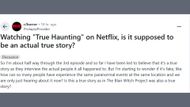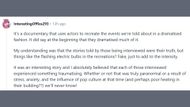True Haunting has become Netflix's latest obsession, and it talks about real-life ghost stories with James Wan's signature polish. But the biggest question fans on Reddit are now asking online is, how much of it actually happened?
The five-part series, which includes interviews and dramatized retellings, has left Reddit split down the middle. Some fans are convinced it's real, while others believe it's all clever cinematic illusion.
Let's break down why the show has everyone questioning what's real and what's just spine-chilling storytelling.
Reality Vs Retelling: Dissecting True Haunting’s truth claims
True Haunting on Netflix is a series that has been based on real-life true events, and well, hence the name. With Wan's touch, every single episode unfolds in a slow and eerie way, and it feels like a documentary of sorts while also having a movie-esque tension.

The first half, "Eerie Hall," follows college student Chris DiCesare's 1980s dorm room haunting, while "This House Murdered Me" looks into a family's home experience in Salt Lake City.
Both of these stories, or rather real-life happenings, balance confessional interviews with scenes that have been dramatized, which is why the show feels a little too cinematic to be 'based on true events,' which is exactly where the Reddit debate sparks its fire.
User ProlapseProvider started a discussion by wondering,
"But I'm starting to wonder if it's fake...Is this a true story, or true in the way The Blair Witch Project was?"

Others quickly jumped in with takes and opinions of their own.
Buttermilk-Waffles argued;
"None of them are true even the so-called 'based on a true story ones are all fabricated for entertainment."

Meanwhile, SignificanceOk430 defended the series, replying;
"They're paranormal encounters from the viewpoint of those who lived them—like have y'all never seen reenactment shows based on true stories?"

The show itself leaves breadcrumbs for both sides. It opens by admitting that events are "dramatized," which makes True Haunting so hard to pin down.
The Psychology of Belief: Why people experience True Haunting differently
The thing that's so gripping about the new Netflix show isn't just the paranormal experiences and stories, but it's also, in a way, the people who are watching this at home.

InterestingOffice293 summed it up neatly by saying:
"It's a documentary that uses actors to recreate events... The stories told by those interviewed were their truth."

They went on to say they believed the people truly endured something traumatic, even if it wasn't supernatural. That comment resonated deeply, capturing what makes True Haunting unique; it's not only about what's seen but also what's felt.
Others, like CleverUserName1961, insisted that skepticism stems from a lack of experience:
"Anyone who doesn't believe has never experienced anything like this, and I hope you never will because it's terrifying."

But skeptics like Ponspilate weren't convinced, calling the show "very obviously fake" and criticizing the acting as "exaggerated."
"It is very obviously fake, also the actors don’t know how to act realistically, exaggerated reactions or on the contrary they’re smiling while telling the stories…"

This tug-of-war mirrors how audiences consume modern horror. Half are in search of the truth, and half enjoy the illusion. Wan's involvement fuels this duality. His visual storytelling plays with the very idea of scary camera shots, unsettling silences, and realism that keeps the audience guessing if what they see is real or not.
True Haunting leaves the audience feeling haunted, not just by the 2 creepy stories but also by doubt. The show thrives in the grey, or a middle zone where reality and imagination blur.
Whether you're a believer, a skeptic, or someone who's stuck in between, the show forces one realization, and i.e., belief itself can be its own kind of haunting.
As Reddit continues to argue over what's fact or fiction, True Haunting achieves its goal in making us all question what we think we know about the supernatural.
Stay tuned to SoapCentral for more.
Also read: Is True Haunting on Netflix based on real events?
